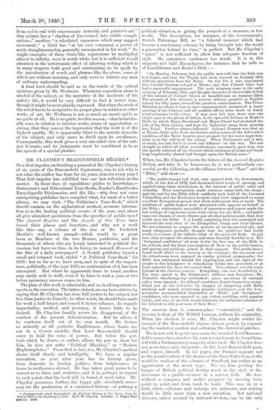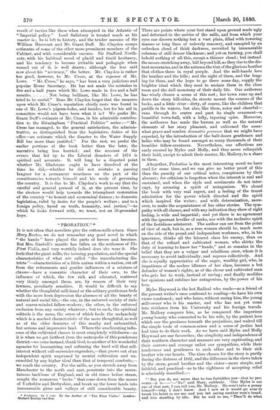MR. CLAYDEN'S BEACONSFIELD REGIME.* Oua first impulse, on finishing a
perusal of Mr. Clayden's history of six years of the Beaconsfield Septennate, was to ask why is not what the author has done for six years, done for every year P That first impulse has solidified into our last reflection on the matter. In these days of expeditious guides to knowledge,— Statesman's and Educational Year-Books, Reader's Handbooks, Encyclopmdic Dictionaries, and the like,—why does not some enterprising publisher have compiled what, for want of a better phrase, we may style "lie Politician's Year-Book," which should contain, on the alphabetical method, accurate informa- tion as to the leading political events of the year, and, above all give abundant quotations from the speeches of public men P The Annual Register and the Annals of Our Time have found their places and functions, and why not a work like this—say, a volume of the size of Mr. Frederick Martin's well-known annual—which would be a great boon to Members of the two Houses, publicists, and the thousands of others who are keenly interested in political dis- cussion, but have no time, in its hurry, to ransack Hansard or the files of a daily newspaper ? A Scotch publisher issued a small and compact book, styled "A Political Year-Book" for 1878; but so far as we have seen, and in spite of the import- ance, politically, of the year 1879, no continuation of it has been attempted. But where he apparently fears to tread, another may surely seek to walk, even if he have to wait a year or two before pecuniary success comes to him.
The plan of this work is admirable, and so, in all important re- spects,is the execution. The latter, indeed, we can best criticise by saying that Mr. Clayden has done full justice to his subject, but less than justice to himself ; in other words, he should have made his work a half larger, and issued it in two volumes. As regards impartiality, method, and accuracy, it leaves little to be desired. Mr. Clayden frankly avows his disapproval of the conduct of the present Administration. But he allows it to condemn itself out of its own mouth. He desires as ardently as all patriotic Englishmen, whose heads are not in a Cowen muddle, that Lord Beaconsfield should cease to hold the reins of power. But below the por- trait which he draws, or rather, allows his pen to draw for him, he does not write "Political Blackleg," or "Modern Mephistopheles." From first to last, too, Mr. Clayden's method shows itself clearly and intelligibly. We have a regular transition, as year after year has its history given, from domestic to foreign politics, from helplessness at home to restlessness abroad. He has taken great pains to be correct as to dates and statistics, and it is, perhaps, in regard to such points that the book will be found of most value. Mr Clayden possesses, further, the happy gift—absolutely neces- sary for the production of a condensed history—of putting a
• England tinder Lord Beaconsfield ; The Political History of Six Year., from the End of 1873 to the Beginning of latiO. By P. W. Clayden. London: C. Regan Paul and Co. 1880. political situation, or giving the purport of a measure, in few words. The description, for instance, of the Government's Scotch Patronage Bill, as "a Liberal measure which had become a reactionary scheme, by being brought into the world a generation behind its time," is perfect. But Mr. Clayden's "space" is not sufficient to allow him adequate freedom of style. He sometimes condenses too much. It is in this snippety and bald Macaulayese, for instance, that he tells us of Isandhlwana and Rorke's Drift :-- "On Monday, February 3rd, the public was told that the Zulu war had begun, and that the Tugela had been crossed on January 12th without opposition from the Zulns. On the 7th it was announced that Colonel Pearson had got to Ekowe, and that Colonel Glyn had had a successful engagement. The next telegram came in the early morning of February 11th, and brought the news of the terrible defeat of this column of Colonel Glyn's at Isandhlwana on January 22nd. The account of this disaster, a reverse without parallel in English history for fifty years, created the greatest consternation. The Prime Minister, to whom it was at once communicated, summoned a hasty meeting of the Cabinet, and all possible efforts were made to hurry reinforcements to the scene. It was soon felt that there was One bright spot in the gloom of defeat, in the splendid defence at Rorke's Drift, by which Major Bromhead and Major Chard had stemmed the tide of the Zulu victory, and kept the barbarian army from pouring into Natal. Portlier alarms followed. Colonel Pearson was shut up at Ekowe, forty miles from the border, and accounts of the defenceless condition of the Natal frontier gave grounds for the worst apprehen- sions as to the safety of the colony. When Parliament met it was, as usual, too late for it to exert any influence on the war. The one thought to which all other considerations necessarily gave way, was the speedy reversal of the disaster which weakness at home and head- long impetuosity abroad had brought upon the British arms."
When, too, Mr. Clayden bursts the fetters of the Annual Register diction, and tries to be humorous, lie is not particularly suc- cessful, as the following, on the alliance between "Beer" and the " Bible," will show :— " The public-houses bad their own quarrel with the Government, which, in the Act of 1872, had shortened their hours of opening, and applied some other restrictions, in the interest of public order and morality. They consequently made common cause with the clergy;
and the zeal for the Bible which suddenly took hold of the Licensed Victuallers and the Beerhouse-keepers must have suggested to many
excellent Evangelical people that their millennium was at hand. The- windows of public-houses were placarded with appeals on behalf of the Bible; enthusiastic assemblies of roysterers and topers made the low ceilings of tap-rooms shake with cheers for the Bible ; and publi- cans and sinners of every degree put all other politics aside, that they might save the Bible. It is hardly surprising that this unwonted zeal deceived the very elect of the Evangelical clergy and their friends. We are reluctant to suspect the motives of an unexpected ally, and many clergymen probably thought that the publicans had really awoke to a sense of the infinite value of the good old Book. At any rate, they accepted the alliance, and were heartily faithful to it. The Scriptural candidates' all went in for the free use of the Bible in the schools, and the freer consumption of Beer in the public-honses, and parson and publican joined in their support. The public-house found itself allied to the rectory or the vicarage; the tap.room and the school-room were engaged in similar political propaganda ; the Bible was enthroned behind the tippling-bar, and the right of the people to due indulgence in stimulating drinks was preached, or at least agitated for, from the sacred desk. This alliance was the main feature in the election contest. Everything else was dwarfed by it. The issue raised in Mr. Gladstone's Address was forgotten ; Mr. Disraeli's blundering was overlooked ; great questions of national policy were ignored ; the Liberal candidates found themselves every- where put on the defensive by charges of tampering with Bible teaching and unduly restricting popular indulgence, and the Con- servatives recommended themselves as 'Bible' and 'Scriptural' candidates, who were opposed to any violent meddling with popular habits, and who, if elected, would frustrate the nefarious schemes of the Liberals to rob poor men of their Beer."
The sarcasm here is common-place "conventicle," and the jocosity is that of Sir Wilfrid Lawson, without his originality. When the election is over, Mr. Clayden might render his manual of the Beaconsfield regime almost perfect, by expand- ing the narrative portion and softening the rhetorical patches.
We do not seek to point once more the moral of Lord Beacons- field's career since, much to his own astonishment, he found him- self with a Parliamentary majority at his back. Mr. Clayden does not, as we have said, vituperate; he lets Lord Beaconsfield pose, and expose, himself. In his pages, the Premier appears not as the actual realiser of the dreams of the Emir Fakredeen, or the would-be realiser of the schemes of Strafford, but rather as an opportunist of the worst type. We see him guiding the barque of British political destiny much . in the style of the steersman of a paddle-steamer in a narrow firth. He does without a compass, and makes progress by steering from point to point, and from bank to bank. This may do in a firth, where collisions and icebergs are unknown, and sinking would be little more than a new sensation. But national. disaster, unless averted by national wisdom, can be the only result of tactics like these when attempted in the Atlantic of Imperial policy." Lord Salisbury is treated much as his master is ; he is left to history, and the tender mercies of Sir William Harcourt and Mr. Grant Duff. Mr. Clayden essays 'estimates of some of the other more prominent members of the Cabinet, and with considerable success. Sir Stafford North- cote, with his habitual mood of placid and timid hesitancy, -and his tendency to become irritable and pedagogic when roused out of it, is well drawn ; although the less said now about his "accuracy," the better. Mr. Clayden is rather too good, however, to Mr. Cross, at the expense of Mr. Lowe. "Mr. Cross," he says, "has been a very judicious and popular Home Secretary. He has not made the mistakes in five and a half years which Mr. Lowe made in five and a half months Not being brilliant, like Mr. Lowe, he has tried to be useful." Does Mr. Clayden forget that the measure upon which Mr. Cross's reputation chiefly rests was found in one of Mr. Lowe's pigeon-holes, and besides, but for his aid in 'committee would not have been what it is ? We prefer Mr. Grant Duff's estimate of Mr. Cross, in his admirable contribu- tion to the Birmingham "Practical Politics" series :—" Mr. Cross has managed, to the general satisfaction, the adminis- trative, as distinguished from the legislative, duties of his .office—an estimate which the disaster to the Water Supply Bill has more than justified." For the rest, we prefer the earlier portions of the book better than the later, the narrative being less hurried ; and the account of the events that led up to the Liberal disasters of 1874 is spirited and accurate. It will long be a disputed point whether Mr. Gladstone ought to have dissolved at the time he did,—whether he did not mistake a passing languor for a permanent weariness on the part of the constituencies towards himself and his mode of governing the country. It is due to Mr. Clayden's work to say that the 'careful and general perusal of it, at the present time, by the electors would help towards the triumphant restoration of the country "to honest and economical finance ; to domestic iegislation, ruled by desire for the people's welfare ; and to a foreign policy, based on truth, humanity, and justice,"—to which he looks forward with, we trust, not an ill-grounded • lope.



































 Previous page
Previous page